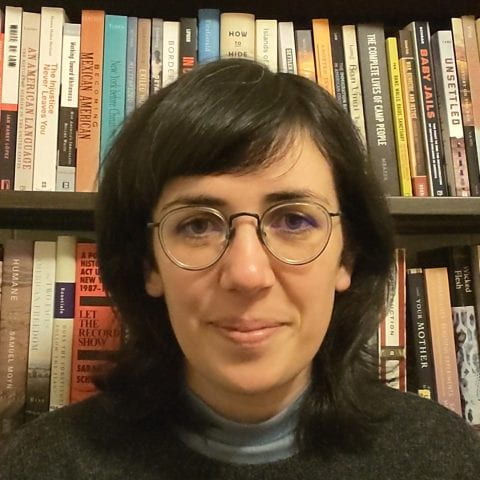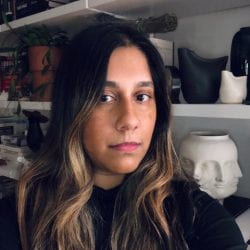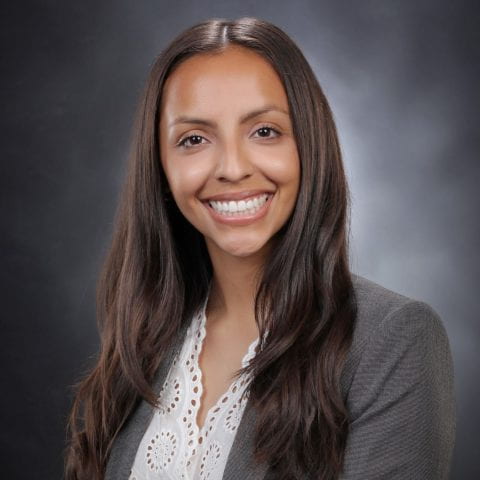PHI Leadership
 Paraska Tolan-Szkilnik, Director
Paraska Tolan-Szkilnik, Director
Paraska Tolan-Szkilnik is an Assistant Professor of History at Cornell University. She specializes in questions of race, gender, and sex in the post-colonial Maghreb. She has published in Jadaliyya, the Arab Studies Journal, World Art, Monde(s), The Markaz Review, and the International Journal of Middle East Studies, amongst others. Her first book, Maghreb Noir: The Militant-Artists of North Africa and the Struggle for a Pan-African, Postcolonial Future (Stanford UP, 2023) looks at the history of pan-Africanism in the post-colonial Maghreb.
Edward E. Baptist, Professor of History
Ernesto Bassi Arevalo, Associate Professor of History
Judith Byfield, Professor of History
Derek Chang, Associate Professor of History
Durba Ghosh, Professor of History
Larry Glickman, Stephen and Evalyn Milman Professor of American Studies
Denise N. Green, Associate Professor of Fiber Science and Apparel Design and Director of the Cornell Fashion + Textile Collection
Ben Sandberg, Director of The History Center in Tompkins County
Paraska Tolan-Szkilnik, Assistant Professor or History and Director of the Public History Initiative
Past Affiliates
 Kaitlin Findlay, Web Editor
Kaitlin Findlay, Web Editor
Kaitlin Findlay is a doctoral student in the Cornell History Department. Her current research examines forced displacement, humanitarianism, and memory in the mid-twentieth century. Kaitlin completed her BA History (Honours) at McGill University and her MA Thesis at the University of Victoria, Canada. She has over seven years’ experience in community-engaged and public history, including with the award-winning Landscapes of Injustice project. She has published with McGill-Queen’s University Press and the Canadian Historical Review.
 Priyanka Sen, Web and Publicity Designer
Priyanka Sen, Web and Publicity Designer
Priyanka Sen is a second year Ph.D. student in the History of Architecture and Urban Development program in the College of Architecture, Art and Planning at Cornell University. Her research investigates architectural entanglements with spatial geographies, institutionalized inequalities, human migration and environmental histories. She interrogates several major themes throughout her work, including ecological disasters that promote and perpetuate geological and spatial violence; migration and the immigrant experience in the United States; and the landscapes of memory. She has previously taught design studios at the University of Cincinnati and worked as an architectural designer across the United States, including in Boston, Cincinnati, Philadelphia, and Portland, Oregon. She holds a Master of Architecture from the University of Cincinnati; a M.A. in Architectural History and Theory from the University of Texas – Austin; and a B.A. in Art History and Architectural Studies with a minor in Women’s Studies from Boston University. She is genuinely thrilled to be bringing her design skills to the Public History Initiative!
 Lyrianne González, PHI Graduate Fellow, Fall 2021
Lyrianne González, PHI Graduate Fellow, Fall 2021
Lyrianne González is a fourth-year History Ph.D. student minoring in Latino Studies and served as a PHI graduate fellow in Fall 2021. She graduated from California State University, Northridge in 2019 with a double major in Psychology and Chicana/o Studies. As an HSI Pathways/Mellon Student Fellow, she examined the trajectories of children of Braceros by putting archival material concerning education into conversation with oral histories. At Cornell, her research has expanded to investigating the racial and generational legacies of U.S. agricultural guestworker programs. In 2020, she was selected to take part in the University of Texas at Austin’s Voces Oral History Summer Research Institute, where she learned how to conduct oral histories effectively and ethically and make her research publicly accessible. She has worked with Black Farmers United of New York State by collecting oral histories of Black farmers to bring attention to the disparities they have faced. In the summer of 2021, Lyrianne was awarded the Cornell Summer Graduate Student Fellowship in Digital Humanities. Through this fellowship, she created a publicly accessible digital humanities project that maps guestworker migratory flows: their origin countries and receiving U.S. states, you may visit the project here. Most recently, she was a 2021 Smithsonian Latino Museum Studies Program fellow, where she honed in on her Latinx Studies and Public History interests. As the Fall 2021 Public History Initiative Graduate Fellow, Lyrianne is thrilled to bring the skills she has gained from her past public history experience and guide undergraduates interested in the field.
 Stephen Vider, Director, Public History Initiative, 2019-2024
Stephen Vider, Director, Public History Initiative, 2019-2024
Stephen Vider is Associate Professor of History at Bryn Mawr College. He was previously Associate Professor of History at Cornell University, and founding director of the Public History Initiative from 2019 to 2024. His research examines the social practices and politics of everyday life in the 20th century United States, with a focus on intersections of gender, sexuality, race, and ethnicity. His first book, The Queerness of Home: Gender, Sexuality, and the Politics of Domesticity After World War II (University of Chicago Press, 2021), traces how American conceptions of the home have shaped LGBTQ relationships and politics from 1945 to the present. Vider has also contributed to a range of public history projects. At the Museum of the City of New York, he curated the exhibition AIDS at Home: Art and Everyday Activism (May to October 2017), exploring how activists and artists have mobilized domestic space and redefined family in response to HIV/AIDS, from the 1980s to the present.


 Abikal Borah, ACLS Emerging Voices Postdoctoral Fellow, 2021-2022
Abikal Borah, ACLS Emerging Voices Postdoctoral Fellow, 2021-2022